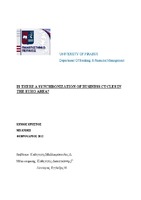I sthere a synchronization of business cycles in the euro area

Master Thesis
Συγγραφέας
Κέμος, Χρήστος
Ημερομηνία
2012-05-02Προβολή/
Θεματική επικεφαλίδα
Business cycles -- Europe ; Business cycles -- Econometric models ; Monetary unions -- EuropeΠερίληψη
The introduction of the euro was a major structural change that transformed Europe's financial architecture. When countries join a monetary union they leave to a supranational decision maker, traditional instrument for the control of the business cycles. One of the main perceived costs from monetary integration is that member countries loose direct control over national monetary policy. This prevents them from undertaking business-cycle stabilization: the cost that is represented by wider cyclical fluctuations is more severe when shocks are asymmetric vis-Α-vis the other partner countries. Differences in levels of economic activity are persistent. Some countries seem to converge; others do not seem to catch up. Business cycle fluctuations in countries with similar starting conditions are driven by euro area wide shocks which propagate in a homogeneous way. Contrary, periphery countries are largely affected from some idiosyncrasies. Heterogeneity is generated by small and persistent idiosyncratic shocks while most output variation is explained by a common shock.


